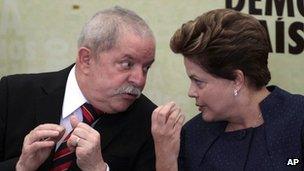Brazil truth commission begins rights abuse inquiries
- Published

President Rousseff (right) was herself jailed and tortured during military rule
Brazilian President Dilma Rousseff has inaugurated a truth commission to investigate rights abuses, including those committed during military rule.
The four previous living presidents since democracy was restored in 1985 also attended the ceremony in Brasilia.
The commission will examine the period from 1946 to 1988, but a military-era amnesty means there will be no trials.
There has already been criticism from army officers and victims' relatives of the commission's remit.
Among many in the military there is disquiet with an inquiry they perceive as an ideologically biased attempt at revenge, the BBC's Brazil correspondent Paulo Cabral reports.
Parallel commission
President Rousseff, herself jailed and tortured during the military dictatorship, said on Wednesday that the motive behind the commission was not revenge, hate or the desire to rewrite history.
It was a "celebration of the transparency of truth", she said.
"Brazil deserves the truth, new generations deserve the truth, and - above all - those who lost friends and relatives and who continue to suffer as if they were dying again each day deserve the truth," President Rousseff said, with her voice breaking.
She stressed that the decision to establish the commission was an initiative of the Brazilian state, not government.
For that reason, Ms Rousseff said, she was delighted to be accompanied by her predecessors as president: Jose Sarney, Fernando Collor de Mello, Fernando Henrique Cardoso and Luiz Inacio Lula da Silva.
Memories of Brazilian military rule
The UN High Commissioner for Human Rights, Navi Pillay, described the creation of the commission as "a necessary and very hopeful step".
The seven-member commission will have two years to investigate human rights crimes, with the focus being on the military era from 1964 to 1985.
Up to 500 people were killed or disappeared during this time in Brazil - a far lower number than in shorter periods of military rule in neighbouring Argentina and Chile.
But thousands of Brazilians were tortured, exiled or deprived of their political rights.
Supporters of the truth commission argue that it will help Brazil to come to terms with its recent past.
But an amnesty law, passed in 1979 and upheld in 2010 by the Supreme Court, means neither military officials accused of torture nor left-wing guerrillas accused of violence can face prosecution.
For some families of the victims, this means the commission is already limited in what it can achieve, a view rejected by member Paulo Sergio Pinheiro.
"We are not here to punish, that's not the job of any truth commission in the world," Mr Pinheiro told BBC Brasil.
Some members of the military are also unhappy at the prospect of the commission's investigations.
Retired officers have announced that they are setting up a parallel commission to counter any accusations that emerge.
- Published16 May 2012
- Published14 March 2012
- Published27 October 2011
- Published27 October 2011